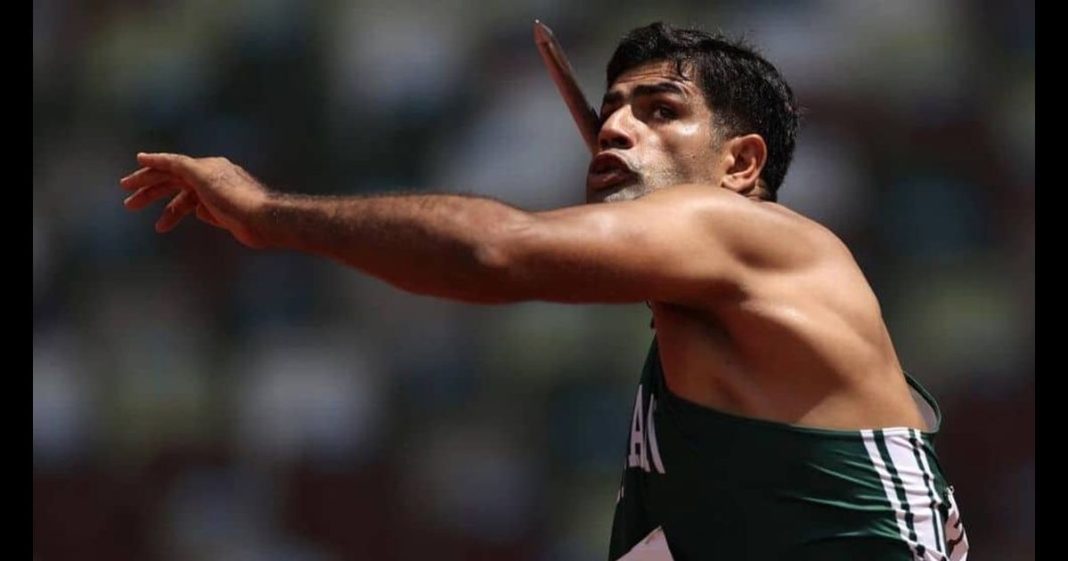n an increasingly interconnected digital world, India’s decision to block Pakistani Olympic gold-medalist Arshad Nadeem’s Instagram account reveals the deeply politicized lens through which cross-border interactions are now viewed. Following the tragic Pahalgam terror attack in Indian Illegally Occupied Jammu and Kashmir (IIOJK), New Delhi has launched a sweeping clampdown on prominent Pakistani voices online—both from the world of media and sports. Nadeem, whose excellence in athletics once brought cheers from both sides of the border, now finds his Instagram account inaccessible in India “due to a legal request.”
This move has provoked concern and criticism in Pakistan. Arshad Nadeem is not a political figure or a media commentator; he is a symbol of sportsmanship, known for his humility and athletic prowess. Banning his account not only sends the wrong message but also demonstrates how strained bilateral ties are now threatening even apolitical cultural and sporting links. If anything, India’s digital censorship strategy smacks of overreach—where even Olympic athletes become collateral in political crossfires.
Targeting Popularity Instead of Propaganda
This recent wave of censorship has seen more than 16 Pakistani YouTube channels, including those run by leading journalists and national news networks, blocked in India. The stated reason? Dissemination of “provocative and communally sensitive content.” Yet there appears to be little distinction between those reporting and those simply existing with large followings. Instagram accounts of public figures like Mahira Khan and Ali Zafar have also been barred, suggesting that popularity, not propaganda, is the true threat.
Read More: Hamas official says group open to freeing hostages, five-year truce in Gaza
Yet the inconsistency is glaring. Former Pakistani cricketers like Shoaib Akhtar, Basit Ali, and Shahid Afridi have had their YouTube channels taken down, but their Instagram accounts remain available in India. Meanwhile, Arshad Nadeem—a sportsman unaffiliated with any controversial rhetoric—has had his Instagram presence removed. This selective targeting indicates not a coordinated fight against misinformation, but a reactive attempt to suppress Pakistani visibility and influence in Indian digital spaces.
Cross-Border Sportsmanship Meets Digital Walls
The irony is hard to miss. Just weeks before the Pahalgam tragedy, India’s javelin hero Neeraj Chopra extended an invitation to Arshad Nadeem to participate in the inaugural NC Classic in Bengaluru. It was a gesture rooted in mutual respect—one athlete to another. Nadeem declined the invitation due to existing commitments, but the goodwill was widely appreciated by many. Unfortunately, Chopra’s gesture was met with backlash from fringe voices within India, leading him to publicly defend both his invitation and his mother, who was also dragged into the controversy.
This hostile reaction undermines efforts at soft diplomacy through sport. When athletes become targets of extremist rhetoric or official censorship, the space for peacebuilding and cultural exchange narrows drastically. Pakistan’s disappointment with the banning of Arshad Nadeem’s account is not just about one profile—it’s about the symbolic erasure of a figure who should stand above politics.
A Slippery Slope for Press and Digital Freedom
It is deeply troubling that, in the aftermath of the Pahalgam attack, India has chosen to respond with sweeping digital censorship instead of focusing on transparent investigation and evidence-based diplomacy. The government’s claim that Pakistani entities were behind the attack remains unsubstantiated. Islamabad has firmly denied any links, yet Indian authorities have chosen to weaponize internet platforms as tools of narrative control.
The ban on Arshad Nadeem’s Instagram, and others like it, reflects a pattern of intolerance toward dissent and alternative viewpoints. If press bodies and digital rights advocates remain silent now, the slope becomes even more slippery for global norms around freedom of expression. From YouTube journalists like Asma Shirazi and Umar Cheema to mainstream media outlets like ARY News and Geo, the restriction of these channels cuts off millions of viewers from diverse perspectives, which are crucial in any democratic discourse—even cross-border ones.
At the heart of this digital crackdown lies a growing anxiety: that Pakistani voices—be they journalistic or athletic—continue to resonate with Indian audiences. Arshad Nadeem’s blocked account is not just about an athlete; it is a reflection of how even shared admiration is now seen as a threat. And in that, the loss is not just Pakistan’s—it’s a collective one for South Asia.














